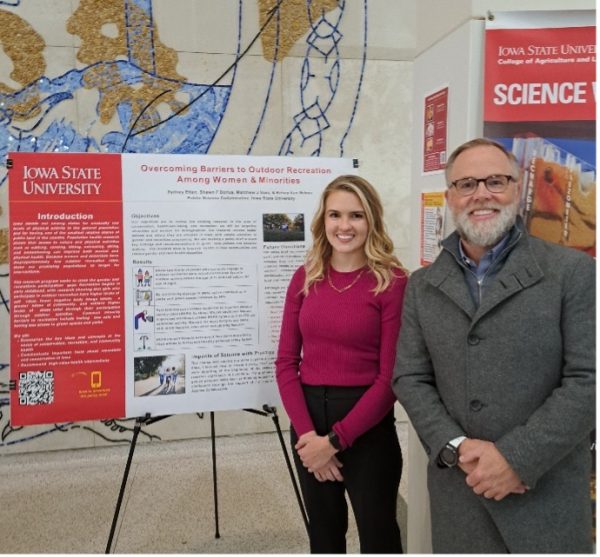 Sydney Etten (‘24 agricultural and rural policy studies) worked with Dr. Shawn Dorius on a research project investigating the barriers that women and minorities face in participating in outdoor recreation, and she presented her findings at the ISU Health and Well-Being Symposium on February 2, 2024.
Sydney Etten (‘24 agricultural and rural policy studies) worked with Dr. Shawn Dorius on a research project investigating the barriers that women and minorities face in participating in outdoor recreation, and she presented her findings at the ISU Health and Well-Being Symposium on February 2, 2024.
Sydney was introduced to Dr. Dorius’s research team through Associate Dean Carmen Bain, who she works with in CALS Student Services. With support from the department and the CALS Science with Practice Program, she has been working as part of the Public Science Collaborative to gather the most recent information about the participation rates of women, new immigrant groups, and racial and ethnic minority groups in outdoor recreation activities, like walking, running, and biking.
“As someone who spends a significant amount of time outdoors, I wanted to better understand why different demographic groups vary in their outdoor recreation choices. My literature review found that some of the most important barriers are safety, lack of confidence, and body image issues, especially for women.”
Because outdoor recreation has many physical and mental health benefits, including lower stress, anxiety and depression; better sleep; and lower risk of cardiovascular disease, hypertension, and diabetes, this research can inform community programs, health interventions, and ultimately, more equity in community infrastructure.
“Prior to this project, I couldn’t have told you anything about the importance and value of gender in determining health outcomes and community engagement. After diving into this research area, I have developed an evidence-based gender lens that informs my view of recreation, exercise, and the parts of life spent outdoors.” There is a clear need for more tailored public and community resources for groups such as women, girls, and underserved populations to ensure equitable access to recreation and physical health infrastructure and programs.
Sydney shared that “[t]his research experience confirmed that I want to further develop my research skills. For this reason, I have applied to graduate school here at Iowa State and look forward to developing strong social science field research skills that will help me to move the needle in the sustainable agriculture space.”
Projects like the one Sydney worked on illustrate how students taking SOCCJ courses often get the chance to work directly with faculty on real-world projects that are having impact on the health and wellbeing of people and communities.
